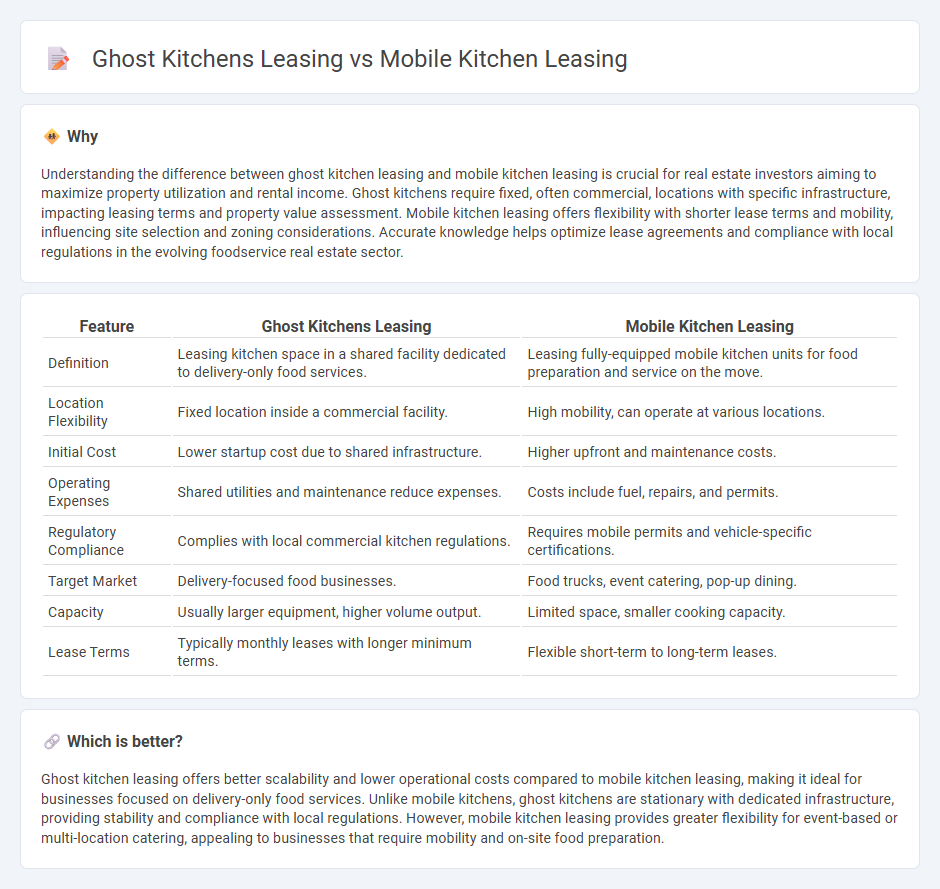
Ghost kitchen leasing offers restaurants dedicated, fully equipped spaces optimized for delivery-only food preparation, reducing overhead costs associated with traditional dining establishments. Mobile kitchen leasing provides flexibility with portable units, ideal for food trucks, events, or seasonal operations, allowing businesses to reach diverse locations without long-term commitments. Explore the benefits and considerations of each option to find the best fit for your food service venture.
Why it is important
Understanding the difference between ghost kitchen leasing and mobile kitchen leasing is crucial for real estate investors aiming to maximize property utilization and rental income. Ghost kitchens require fixed, often commercial, locations with specific infrastructure, impacting leasing terms and property value assessment. Mobile kitchen leasing offers flexibility with shorter lease terms and mobility, influencing site selection and zoning considerations. Accurate knowledge helps optimize lease agreements and compliance with local regulations in the evolving foodservice real estate sector.
Comparison Table
| Feature | Ghost Kitchens Leasing | Mobile Kitchen Leasing |
|---|---|---|
| Definition | Leasing kitchen space in a shared facility dedicated to delivery-only food services. | Leasing fully-equipped mobile kitchen units for food preparation and service on the move. |
| Location Flexibility | Fixed location inside a commercial facility. | High mobility, can operate at various locations. |
| Initial Cost | Lower startup cost due to shared infrastructure. | Higher upfront and maintenance costs. |
| Operating Expenses | Shared utilities and maintenance reduce expenses. | Costs include fuel, repairs, and permits. |
| Regulatory Compliance | Complies with local commercial kitchen regulations. | Requires mobile permits and vehicle-specific certifications. |
| Target Market | Delivery-focused food businesses. | Food trucks, event catering, pop-up dining. |
| Capacity | Usually larger equipment, higher volume output. | Limited space, smaller cooking capacity. |
| Lease Terms | Typically monthly leases with longer minimum terms. | Flexible short-term to long-term leases. |
Which is better?
Ghost kitchen leasing offers better scalability and lower operational costs compared to mobile kitchen leasing, making it ideal for businesses focused on delivery-only food services. Unlike mobile kitchens, ghost kitchens are stationary with dedicated infrastructure, providing stability and compliance with local regulations. However, mobile kitchen leasing provides greater flexibility for event-based or multi-location catering, appealing to businesses that require mobility and on-site food preparation.
Connection
Ghost kitchen leasing and mobile kitchen leasing intersect in the real estate sector by utilizing underutilized commercial spaces for food preparation and delivery operations. Both models optimize real estate assets by converting traditional restaurant spaces or mobile units into rentable kitchen facilities, meeting the growing demand in the food delivery market. This shift maximizes property utilization, increases rental income for landlords, and supports the expansion of foodservice operations without the need for full-service restaurant real estate investments.
Key Terms
Mobility
Mobile kitchen leasing offers unparalleled mobility, enabling food businesses to operate at various locations, events, or festivals with ease. Ghost kitchens leasing typically involves fixed-location facilities designed for delivery-only services, limiting physical movement but optimizing stationary kitchen operations. Explore how mobile kitchens enhance location flexibility compared to traditional ghost kitchen setups.
Facility Use
Mobile kitchen leasing offers flexible, on-the-go culinary spaces ideal for events, pop-ups, and street food vendors, maximizing use of limited outdoor or transient locations. Ghost kitchen leasing provides strategically located, delivery-only commercial kitchens optimized for high-volume food prep without dine-in space, significantly reducing overhead costs. Explore detailed comparisons to determine the best facility solution for your food service business needs.
Licensing Requirements
Mobile kitchen leasing typically requires compliance with local health department permits, vehicle licensing, and mobile vendor regulations to ensure food safety and operational legality. Ghost kitchens leasing involves obtaining commercial kitchen licenses, fire safety certifications, and adherence to zoning laws specific to fixed-location food preparation facilities. Explore detailed licensing guidelines to determine the best fit for your culinary business needs.
Source and External Links
Mobile Kitchen Rental Process - A step-by-step guide for renting a mobile kitchen, covering needs assessment, planning, and setup for various scenarios.
Mobile Kitchen Solutions - Offers customizable temporary kitchen rentals for short-term and long-term needs, including modular facilities and equipment rentals.
California Mobile Kitchens - Specializes in short and long-term mobile kitchen leasing solutions for various events and situations, including disaster relief and film sets.
 dowidth.com
dowidth.com